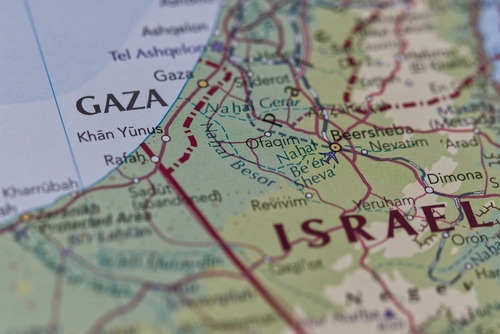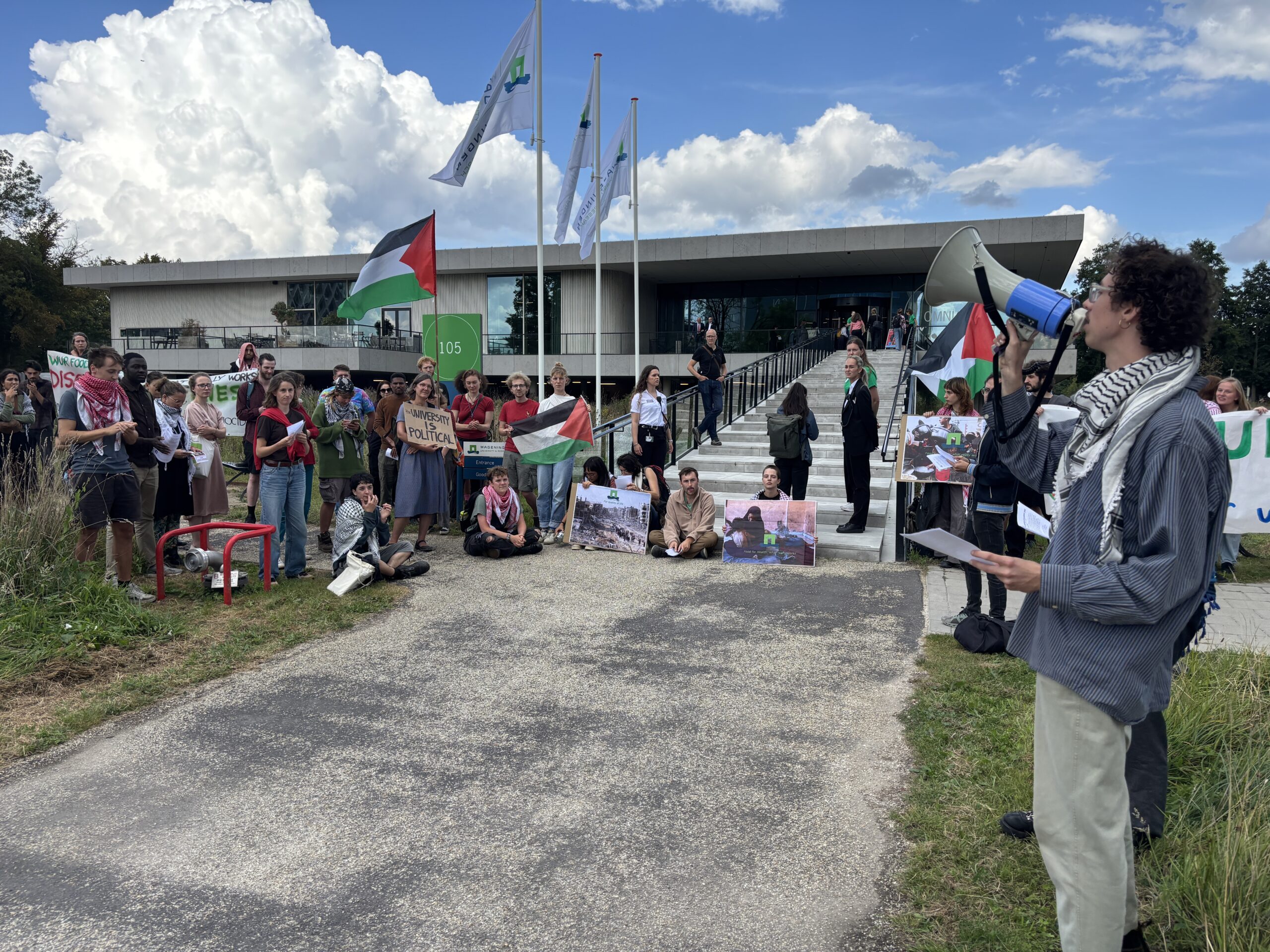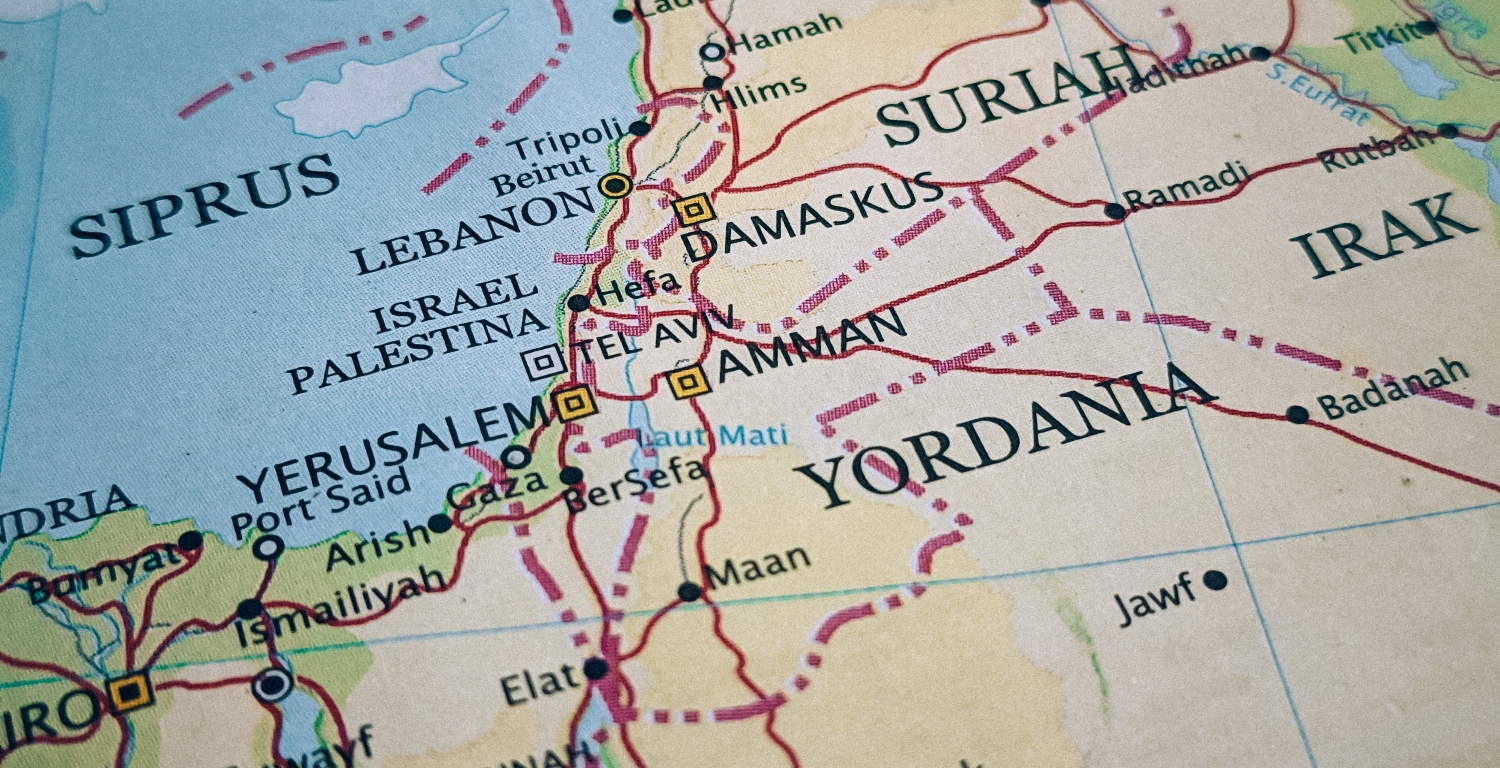Today, and last Thursday, pro-Palestine activists blocked both entrances to the Atlas building, where the Executive Board works. Their message: WUR must cut ties with Israel. Their frustration is real, but so is the question: does blocking access and rejecting dialogue brings us closer to ‘peace’ or push us further into division?
What good comes from cutting ties with Israel? Alienating institutions that do not control political decisions is not productive, especially when these institutions offer valuable academic and humanitarian benefits to WUR. For the greater good of our university, we should ask whether such actions have meaningful impact or just limit our own opportunities for learning and collaboration.
The Israeli-Palestinian conflict is often simplified into a story of Palestinian victimhood versus Israeli wrongdoing. Yet the reality is more complex. Gaza is governed by Hamas, a designated terrorist organization that gained control with public support and has since fueled violence and hardship across the region. That’s part of the reality too, yet it is frequently left unspoken.
Symbolic acts like hunger strikes or blockades draw attention. But attention alone doesn’t create change. Dialogue does. Listening does. Seeking to understand, even when it is difficult, does.
At a university, we should be challenged, not only by others, but by ideas that makes us uncomfortable. This includes the media, and it includes ourselves.
If we care about justice, we must stop turning away from complexity. I urge Resource to strive for balanced journalism that reflects multiple sides of the story. And to my fellow students: stay curious. Question the headlines. Seek nuance. Because when only one side is told, the truth is lost, and with it, our ability to move forward together.
Meital Cohn, Master’s student Resilient Farming and Food Systems

 Photo Shutterstock
Photo Shutterstock 

כתבה מפוספסת. הכותבת מתלוננת על חוסר איזון, אבל כשניתנת לה במה, היא בעיקר עסוקה בלהתלונן למה הצד השני לא בסדר. הכותבת קוראת לדיאלוג, אבל ניכר שהיא לא עשתה מאמץ להקשיב לעמדה שמנוגדת לשלה.
מה קורה פה לדעתי? רוב היהודים בישראל מחזיקים בתפיסת עולם שיוצאת מנקודת מוצא שכמעט לא מעורערת בישראל. אנחנו מגיעים למקום חדש, ומגלים שהנקודת מוצא הזאת, פתאום היא לא קונצנזוס מוחלט, אלא נקודה שדי קשה להצדיק. וזה די מבלבל ודי מערער. אם לסכם את הנקודה הזאת בשתי מילים: עליונות יהודית.
אנשים שאולי לא כל כך מעורים בסכסוך הישראלי-פלסטיני, רואים מעל 50,000 הרוגים בעזה, מתוכם כ-15,000 ילדים, רואים מצור ורעב, רואים הרס של כל האוניברסיטאות ושל רוב בתי החולים, רואים 95% מהאדמות החקלאיות הרוסות. הם אומרים, בלי צורך להבין יותר מדי, שזה חייב להפסיק.
ומה אומר הישראלי הממוצע: זה מורכב. יש חמאס, יש 7.10, זה מאוד מורכב. אבל למי שחושב שחיים של פלסטיני שווים לחיים של ישראלי, ברור שהרג של 1000 אנשים ב-7.10 לא מצדיק הרג של 50,000 אנשים מאז. ואף מורכבות לא יכולה להצדיק את זה
In English: this piece is a bit of a missed opportunity. The writer complains of imbalanced reporting, but when she is given a platform, she mostly spends it saying what others are doing wrong. She calls for dialogue, but it is obvious she didn’t take the time to listen to viewpoints that are different from her own.
I think what’s happening here is that most Jewish Israelis are immersed in a worldview that is never challenged. When they are outside Israel, they suddenly realize that their viewpoint is not a complete consensus, but actually pretty difficult to justify. And that is uncomfortable and confusing. If I can summarize this viewpoint in two words: Jewish supremacy.
Others who may not be familiar with the intricacies of the Israeli-Palestinian conflict, see more than 50,000 people killed in Gaza, of which 15,000 children. They see a blockade and imposed famine, they see all universities and most hospitals destroyed, they see 95% of agricultural land destroyed. They see, without needing to understand too much, that this must be stopped.
To this, the average Israeli says: it’s complex. There’s Hamas, there’s 7.10, that’s very complex. But if you view Palestinian lives as equal to Israeli lives, obviously the killing of 1000 people doesn’t justify the killing of 50,000. No complexity can justify that.
I’m sorry, but I find the cognitive dissonance in the original article astounding. What nuance are we meant to find in the systematic destruction of the Palestinian population? Where is their justice? (https://decorrespondent.nl/16187/de-slotfase-van-de-genocide-is-begonnen-zo-drijft-israel-de-palestijnen-naar-een-concentratiekamp/df587b2a-c579-06d7-0e15-ba432b320e84). What is the dialogue we are meant to be having, and with who? The Israeli government sure does not seem interested in any dialogue. The Hebrew University of Jerusalem does not seem interested in any dialogue about their occupation of Palestinian land. What dialogue is available to the hundreds of Palestinians slaughtered by Israeli bullets as they wait for food aid? Or the Palestinian families who are violently dispossessed of their generational home in the West Bank to make way for Israeli settlers?
And the call for balanced journalism? It is the perspective of Israel that dominates western media. It is Palestinian voices that have been systematically silenced and marginalised for decades.
We need to call a spade a spade. Israel is engaged in the systematic destruction of Palestinian life in Gaza and the West Bank, and many Israeli universities are complicit in this. If we give any semblance of truth to international law and global human rights, we must resist this destruction by all (non-violent) means available to us, including boycotting Israeli institutions complicit in human rights violations. A increasing majority of Dutch universities now realise this and are taking action – why isn’t WUR?